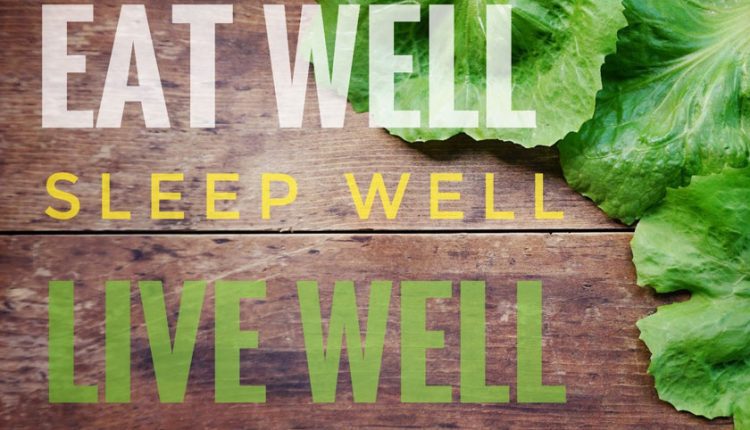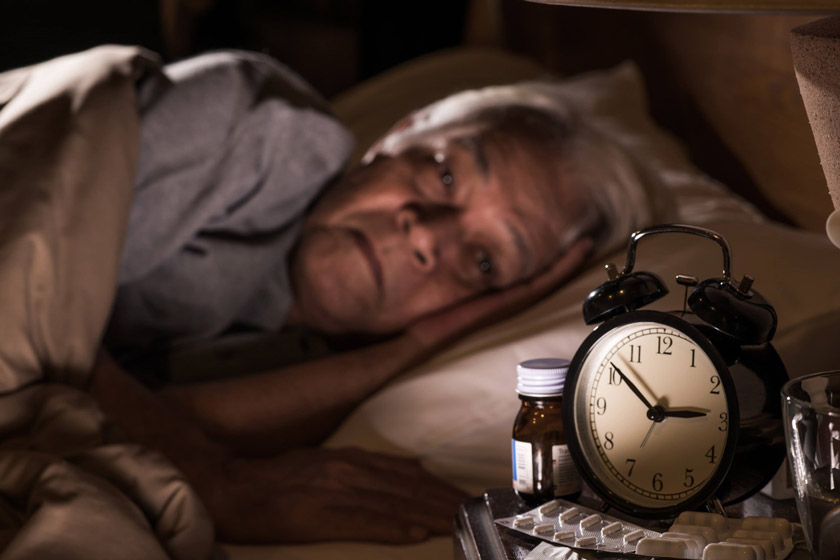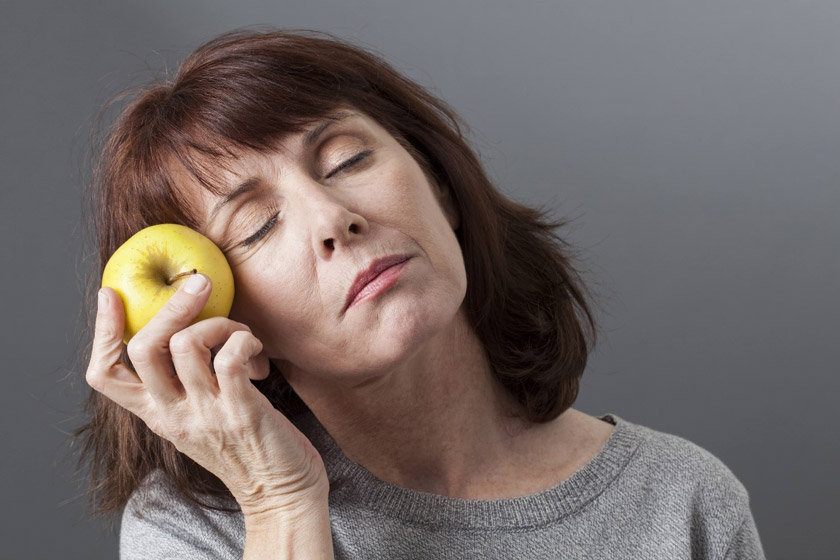
Can you believe each person spends almost one-third of their life sleeping? Consequently, sleep quality strongly contributes to a healthy life. However, all of us will eventually experience some age-related sleep changes that affect every aspect of our lives. During this article, you will learn about some of the most common age-related sleep disorders and foods that help seniors sleep.
Contents
Age-Related Changes in Sleep
A part of the hypothalamus (SCN) is responsible for circadian rhythms. It controls our 24-hour daily cycles, like when people get hungry, the correct time to release hormones, feeling sleepy or alert. Therefore, any changes in the suprachiasmatic nucleus function directly influence circadian rhythms or our biological clock, and consequently, the time when people feel tired and sleepy changes.

Less secretes of hormones like melatonin and cortisol, two essential hormones for sleeping, may happen due to SCN ageing, leading to sleep disruption in seniors. Moreover, several other factors contribute to sleep difficulties in seniors, including physical and mental conditions, diseases, changing lifestyles, etc.
In general, some changes inevitably cause sleep disorders. Some of the most common sleep disturbance causes and symptoms in seniors are summarized below (ref: ncbi):
Primary Sleep Disorders
- Sleep apnea syndrome
- Restless legs syndrome
- Periodic limb movement disorder
- Rapid eye movement
- Sleep behaviour disorder
- Circadian rhythm sleep‐wake disorders (advanced and delayed sleep‐wake phase disorder)
Acute and Chronic Medical Illnesses
- Allergy (allergic rhinitis, hay fever),
- Pain (arthritis, musculoskeletal pain),
- Cardiovascular (heart failure, acute coronary syndrome),
- Pulmonary (pneumonia, chronic obstructive pulmonary disease),
- Metabolic (diabetes, thyroid disorders),
- Gastrointestinal (gastroesophageal reflux disease, constipation/diarrhea, acute colitis, gastric ulcer),
- Urinary (nocturia, incontinence, overactive bladder, benign prostate hypertrophy for men),
- Psychiatric diseases (depression, anxiety, psychosis, delirium, alcoholism),
- Neurological disorders (Alzheimer‘s disease, Parkinson’s disease, cerebrovascular disease, epilepsy),
read here: supplements to prevent dementia
- Pruritus, menopause.
Behavioural Causes and Physiological/physical Stresses
- Daytime napping
- Using the bed for other activities (watching TV, reading)
- Lack of exercise during the daytime
- Death of a partner/spouse
- Loneliness
- Hospitalization
Environmental Causes
- Noise
- Light
- Cold/hot temperature
- Humidity
- Uncomfortable bedding
- Lack of light exposure during daytime
Medications
- Psychostimulants,
- Antidepressants (selective serotonin reuptake inhibitors)
- Antihypertensives (beta‐blocker, alpha‐blocker)
- Antiparkinsonian drugs (levodopa)
- Bronchodilators (theophylline)
- Steroids
- Antihistamines (H1 and H2 blockers)
- Anticholinergics
- Alcohol
- Interferons
The Relationship Between Food and Sleep
There is a mutual relationship between diet and sleep, and food choices influence sleep quality. On the other hand, sleeping enough can also affect eating habits. Thus, choosing the foods to keep you healthy and drinks can be an excellent strategy to promote our sleep quality.
To be more precise, healthy eating allows the body to absorb the appropriate nutrients necessary for the brain to produce hormones to keep enough sleep. Data show that a diet containing less fibre, high saturated fats, and more sugar leads to lighter sleep and more awakenings during the night. Further researches also show that poor sleep patterns drastically contribute to overeating, low diet quality, and obesity. It is also worth mentioning that proper diet and the timing of eating both matter to having a good sleep.

Micro and Macronutrients for Proper Sleep Mechanism
It is noteworthy that no single vitamin or mineral helps you optimize sleep. Instead of having a well-balanced diet containing a wide variety of foods, you need to have healthy sleep patterns. However, in the below-mentioned, we summarized micro/macronutrients found in the foods that affect the sleep mechanisms of our body:
Calcium
It is a mineral compound that helps the brain to produce melatonin. People with calcium deficiency have difficulties falling asleep. It works with magnesium to relax muscles.
Magnesium
This mineral is known as a relaxant. Magnesium deficiency may associate with insomnia and restless legs syndromes.
Potassium
This mineral compound increases sleep efficiency and quality. Potassium deficiency may lead to difficulty staying asleep.
Tryptophan
It is an amino acid necessary for the body to manufacture serotonin hormone. Serotonin is required to produce melatonin. Tryptophan reduces sleep onset time, less daytime sleepiness, and freshness early in the morning.
Vitamin B6
Vitamin B6 assists in converting tryptophan into melatonin. Lack of vitamin B6 may cause lower serotonin and, consequently, poor sleep.
Melatonin
It is a hormone that helps regulate circadian rhythms. It secretes naturally in our body, but it’s also found in food. Some melatonin-containing foods include nuts, fruits and berries, tomatoes, and peppers.
In addition to the nutrients represented above, some studies claim that vitamin D and zinc, along with melatonin and magnesium, may affect insomnia treatment.
Foods That Help You Sleep
Snack wisely before bedtime helps you regulate your sleep and have a higher sleep quality. The macro and micronutrients in the foods can act as sleep-promoting agents, and choosing foods with a high level of this ingredient can be an excellent solution for your sleeping disorder.
Best Natural Sleep Aid for the Elderly
Following foods help you to have a deeper, more relaxed bedtime:
Nutritious Fruits
Fruits are rich in health-promoting nutrients like antioxidants, fibre, minerals and vitamins. The study shows that a rich-fibre diet contributes to deeper sleep and more restless slumber; this helps seniors to have a better bedtime. For example, apples and peach are rich in magnesium. Cherries, specifically tart cherries, provide magnesium and melatonin for the body.
Banana, in this group, is a super fruit! It is rich in potassium, magnesium and tryptophan, all of which help seniors enjoy sleeping time. Kiwi is another fruit that is got attention for senior sleep due to its relation to serotonin. Eating 1-2 mediums of fruits promotes sleep quality and the experience of deeper sleep.

Complex Carbohydrates (Sweet Potato and Beans, and Whole Grains)
Researches show that complex carbs increase tryptophan and serotonin production in the human body. Also, consuming complex carbs prevents blood sugar flocculation that interferes with rest. Complex carbs like sweet potato, beans, brown rice, oatmeal, and popcorn contain a high level of tryptophan.
The National Sleep Foundation report states that eating whole grains, preferably oatmeal, is beneficial because it is rich in phosphorus, magnesium, potassium, and silicon. It has also been revealed that whole grains regulate blood sugar and lead to faster-falling sleep.
Lean Protein Foods (Fish, Turkey, Eggs)
Based on researcher findings, there is a direct relationship between a high-protein diet and high-quality sleep. Lean proteins are excellent sources of tryptophan. One of the significant lean proteins for seniors is the turkey, rich in tryptophan.
Other protein sources are eggs and fish, especially fatty fish. Fatty fishes like tuna, salmon, and mackerel are considered nutrient-dense foods. These can improve seniors’ sleep because they are rich in protein, vitamin D, and omega-3 fatty acids. Researchers claim that combining these nutrients enhances sleep quality since vitamin D and omega-3 can increase serotonin production. It is shown that people eat fatty fish before bed, fall asleep faster and experience deeper sleep.
Heart-Friendly or Unsaturated Fats (Avocado and Nuts, Especially Almond and Walnut)
Contrary to foods high in saturated fat like pizza, French fries, etc., that cause sleeplessness, unsaturated fats like avocado and peanut butter promote sleep quality.
Nuts are an excellent source of minerals, antioxidants and healthy fats that play an essential role in sleep quality. Almonds, especially, are rich in magnesium and 28 g of their daily consumption provides 25% and 31% of daily magnesium needs for men and women, respectively. Besides, it is a source of melatonin, magnesium, and melatonin. All these nutrients play a role in having a high-quality sleep. Other nuts like pistachio also contain melatonin and have the same effect.
Walnut is another nut that helps to get better sleep. It’s a great source of unsaturated fats like omega-3 and ALA (alpha-linolenic acid). These unsaturated fats can increase serotonin in the body, leading to better sleep.

Drinks (Warm Milk, Tart Cherry Juice, and Herbal Tea)
In general, dairy products like milk, plain yogurt, cottage cheese, etc., are rich in calcium and tryptophan, promoting sleep quality in seniors. Drinking a glass of warm malted milk an hour before bedtime would also results in fewer sleep interruptions, probably due to a high amount of vitamin B (from malt) and vitamin D, calcium, and tryptophan (from milk).
Drinking 1 or 2 cups of tart cherry juice is quite beneficial for sleep. Based on scientific research, tart cherries containing an above-average melatonin concentration play a significant role in promoting healthy sleep in seniors.
Drinking chamomile tea (and other herbal teas) can also promote sleep in seniors. These teas help the body and mind to be more relaxed before bed. Chamomile tea has Apigenin, which influences sleepiness and reduces insomnia. A study observed that a group of people who drank chamomile tea for a short period fell asleep 15 min faster and had less nighttime wakening.
Generally, staying hydrated is beneficial to have a good sleep. Drinking Warm milk, tart cherry juice, and herbal tea is vital for deep sleeping, but it also helps you stop snoring in just a few easy steps.
Final words
Our sleep health is tightly connected to our lifestyle and our eating behaviour. Therefore, we can shift our eating behaviour toward healthy foods to experience better and deeper sleep.
Some specific foods containing tryptophan, melatonin, magnesium, potassium, calcium, and vitamin B can also help us promote sleep quality and experience less insomnia and nighttime awakening. Let us know if you have any questions regarding this article in the comment section.
Since I have type 2 diabetes and high blood pressure, I always pay attention to what I eat, especially at night. I usually sleep well, but sometimes I can’t fall asleep, and nothing helps me, not meditation and not even herbal teas. I just lie in bed for hours. I always check my blood sugar and blood pressure; nothing gets out of the ordinary on my sleepless night. I’m thankful this does not happen very often; I wouldn’t survive insomnia!
Thank you. I guess we all underestimate the effect our diet has on the pattern and quality of our sleep. I used to eat junk food all the time. I used to have midnight snacks frequently, and they were not always healthy. But when I fixed my diet, I began to see all my sleeping problems go away one by one.
Wow! Junk foods are awful, my friend! I know they are delicious but don’t forget they don’t have nutrition value. I suggest you eat dried fruits instead of junk foods. In this way, get vitamins and also don’t harm your body. Finally, fruits help you to sleep better.
I don’t know why many people think what you eat is irrelevant to your sleeping. There is clearly and evidently a relation. I ate very unhealthily in my younger days, and my sleep schedule was also messed up. But as I grew older and my responsibilities grew with me, sleep became very important to me, and I started to fix both my sleeping schedule and diet. And when I started to eat more healthy food, it became a lot easier for me.
Exactly! I used to eat spicy foods when I was younger, and it took me years to realize spicy foods are the reason for my insomnia. When you eat spicy foods before bed, you may have trouble sleeping because of an increase in body temperature, and as a result, this causes sleep disturbances.
Fortunately, I don’t have any sleep disorders, but I’ve always used to drink Chamomile herbal tea before sleep since my early 30s. It makes me so relaxed and ready to sleep. I highly recommend it.
Chamomile tea is magic for sleep disorders, yet it may lose its effect over time if consumed so regularly. Besides, the cause of your sleep problems is also essential; as I’ve seen among my family members, chamomile tea may not work for everyone.
I am 58, and I usually drink a bit of water before bed. I make sure not to eat anything before bed because my body does not need to be burning and digesting food when it needs to rest.
I especially turn off the electronics and wind down my brain.
I also love a relaxing cup of tea before bed. I find chamomile tea to be very relaxing before bed.
It’s best not to look for a substance to sleep; just focus on sleep and make a point to set aside time for the proper amount of rest.
Drinking water is another way to increase sleeping quality. Try to drink six or eight glasses of water and keep the last one before bed. Never underestimate the power of water; it can fix everything.
I highly recommend complex carbohydrates such as brown rice, oatmeal, and popcorn. Sleep is promoted by triggering natural chemical reactions involving amino acids and, in many cases, by preventing blood sugar fluctuations that interfere with sleep.
I find tangerines really helpful when it comes to foods that will help me fall asleep easier. It has a sweet and intense aroma that calms me to sleep. If I don’t have any tangerine, I’ll just drink a warm cup of milk or make myself some herbal tea. Ayran is also a beverage effective for better sleep, though it might not be as easy to get as milk or tea. Food aside, there are two other things that do wonders for those looking for a good night’s sleep: Listening to calm music and restricting screentime before going to bed. Don’t watch tv or use your phone if you know you will be sleeping in the next 60 minutes. Trust me. You will find it much easier to fall asleep.
My grandmother used to love drinking tart cherry juice. She used to say stuff like “it helps her relax” or “it’s great for my sleep.” At first, I thought she was joking, but I got curious and looked into it. I didn’t surf the web much before discovering that she was scientifically correct. 🙂